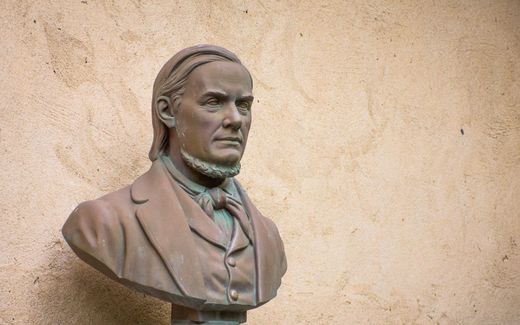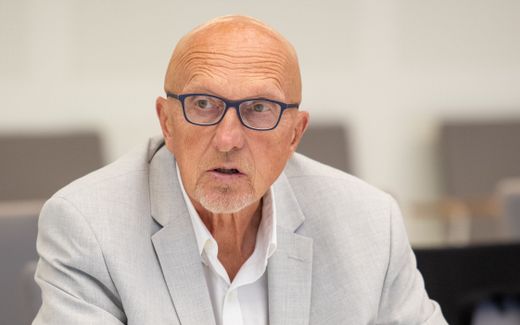Why it is time to return to the Biblical role of the state

If all Christians would practice the neighbour's love, the state would have less work. Photo AFP, Ben Stansall
Opinion
The welfare state is not sustainable. It is time for the state to return to the role the Bible gives the government, Cédric Placentino argues.
Belgium must make cuts of 28 billion euros over the next seven years. That is the demand of the European Commission for the future Belgian government, which has been in formation since last May's elections.
According to recent calculations by Eurostat, Belgium's total public debt was 638 billion euros in the first quarter of 2024. That amounts to 108.2 per cent of the Belgian gross domestic product (GDP). Even if Belgium were to achieve the requirements of the European Commission, the public debt would still be more than 600 billion euros, or, in other words, about 90 per cent of GDP.
How did Belgium get here? Like most other European nations, Belgium has a very expensive social security system. The task awaiting the future government will be, to say the least, very difficult.
Government policy
Following the federal elections last May, the burgomaster of Antwerp, Bart De Wever, was appointed to lead the negotiations for the new government, before resigning last Thursday. De Wever had consulted several Belgian political actors, including trade union leaders, in the attempt to define the broad outlines of government policy for the next five years.
Among them was Pieter Timmermans, the managing director of the Belgian Businesses Federation (VBO/FEB). In an interview for the French-speaking daily newspaper Le Soir, Timmermans explained his desire for intensive state reforms to protect the competitivity of Belgian companies. According to his sources, 5,000 jobs were lost, and many small companies went bankrupt in the first half of this year. A change is indeed needed.
Pieter Timmermans also explained that the current federal budget amounts to approximately 165-170 billion euros a year. Of this amount, 150 billion euros (approximately 90 per cent) are reserved for social security alone. The remaining 15 to 20 billion euros (around 10 per cent) are dedicated to the police, army, and justice system. With an adult population of just over 9 million inhabitants, the cost per adult amounts to more than 18,000 euros per year.
Current cost
With an average gross Belgian salary of more than 46,000 euros per year, the current cost of running the state reaches just over 30 per cent. And then I am not even talking about the debts that need to be repaid by the state.
If the state were not responsible for social security, the cost per citizen would be reduced to 1,600 euros per year, or less than a tenth of the current cost. In that case, the state would need to levy a tax amounting to just 3 or 4 per cent of the average Belgian salary (not including the debt repayment).

Is this an inconceivable idea?
Most Belgians would see it as a nightmare if the state had no more social security system. This is not only seen as inconceivable but simply as irresponsible. And yet, such was the reality everywhere in the Western world before the advent of the welfare state in the twentieth century. Families were primarily responsible for the care of their poor and sick members. When this was impossible at the family level, the church took over most cases.
Intervention
Is it possible to return to that model? A study carried out in the United States a few years ago showed that if each American local church took care of the needs of a single needy family, state intervention would simply be unnecessary.
Such a study does not exist in Belgium. However, even with the low percentage of Christians in the country, the Belgian churches could achieve such a goal if all Christians gave their tithes and offerings.
When the people of Israel demanded a king, the prophet Samuel warned them that if this were the case, the king would take up to 10 per cent of their income, which was considered abominable (1 Samuel 8:15-18). What would Samuel say in Belgium, where the taxpayer may be taxed up to 50 per cent of his revenue?
According to the Biblical worldview, the state's only function is to preserve security and justice in the nation (see, for example, Romans 13). In the Belgian context, such a state would, therefore, cost the taxpayer 3 to 4 per cent of his revenue if the figures given by the head of the VOB/FEB are correct.
Institutions
Pieter Timmermans is advocating for a Belgian state with fewer social responsibilities, and he is right. Even if he does not envisage the total removal of social security, this could even be possible if the country's churches recovered their social functions (see James 1:27, 5:15). As long as Belgium maintains a Hegelian vision of the nation (i.e. the state governing all areas of society), Belgium's gigantic debt will never be paid off.
The Biblical worldview envisions three institutions governing a nation: the state, the church, and the family. These institutions are directly accountable to God in their respective domains. Belgium's solution is to recognise Christ's sovereignty over the country and consequently restore these three institutions to their respective roles. Only in this context will the nation be able to emerge from its financial crisis.
What about other European nations?
Belgium is not alone in having a public debt higher than its GDP. Five other EU countries have a similar situation, and four have worse rates than Belgium: Spain (108,9 per cent) and France (110,8 per cent), for example. Italy (137,7 per cent) and Greece are at the top of the charts (159,8 per cent).
Of the 27 EU nations, only 10 have public debt lower than 50 percent of their GDP, while only three countries have debt under 30 percent: Luxembourg (27.2 percent), Estonia (23.6 percent), and Bulgaria (22.6%). However, the most worrying outcome of Eurostat's recent study is that 20 EU nations have seen their public debt grow.
The dream of the welfare state made people believe that the government should be able to solve all our problems. But now, governments are struggling to solve the growing public debt. One thing is clear: the dream of the welfare state is not living up to its promises.
With the ideal of the welfare state coming to an end, how should we envision the future of the European nations? As explained in this article about Belgium, the future of the European countries will not be ensured if the churches don't return to their God-given task of caring for the poor, healing the sick and providing education.
Related Articles










